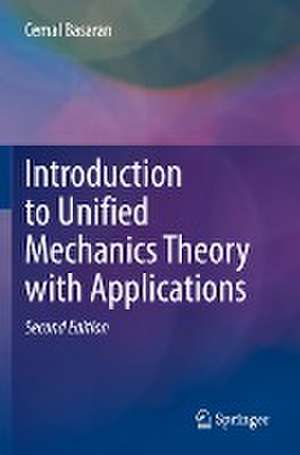Introduction to Unified Mechanics Theory with Applications
Autor Cemal Basaranen Limba Engleză Paperback – 7 ian 2024
| Toate formatele și edițiile | Preț | Express |
|---|---|---|
| Paperback (2) | 397.59 lei 6-8 săpt. | |
| Springer International Publishing – 4 feb 2022 | 397.59 lei 6-8 săpt. | |
| Springer International Publishing – 7 ian 2024 | 468.43 lei 38-44 zile | |
| Hardback (1) | 612.06 lei 38-44 zile | |
| Springer International Publishing – 6 ian 2023 | 612.06 lei 38-44 zile |
Preț: 468.43 lei
Preț vechi: 578.30 lei
-19% Nou
Puncte Express: 703
Preț estimativ în valută:
89.63€ • 93.84$ • 74.17£
89.63€ • 93.84$ • 74.17£
Carte tipărită la comandă
Livrare economică 04-10 aprilie
Preluare comenzi: 021 569.72.76
Specificații
ISBN-13: 9783031186233
ISBN-10: 3031186230
Pagini: 519
Ilustrații: XVIII, 519 p. 192 illus., 75 illus. in color.
Dimensiuni: 155 x 235 mm
Ediția:2nd ed. 2022
Editura: Springer International Publishing
Colecția Springer
Locul publicării:Cham, Switzerland
ISBN-10: 3031186230
Pagini: 519
Ilustrații: XVIII, 519 p. 192 illus., 75 illus. in color.
Dimensiuni: 155 x 235 mm
Ediția:2nd ed. 2022
Editura: Springer International Publishing
Colecția Springer
Locul publicării:Cham, Switzerland
Cuprins
Introduction.- Stress and Strain in Continuum.- Thermodynamics .- Unified Mechanics Theory.- Unified Mechanics of Thermo-Mechanical Analysis.- Unified Micromechanics of Particulate Composites.- Unified Micromechanics of Finite Deformations.- Unified Mechanics of Metals Under High Electrical Current Density: Electromigration and Thermomigration.
Notă biografică
Cemal Basaran is a Professor of Engineering Mechanics in the Department of Civil, Structural, and Environmental Engineering, University at Buffalo, SUNY, Buffalo, New York USA.
Textul de pe ultima copertă
This second edition adds new sections on derivation of dynamic equilibrium equations in unified mechanics theory and solution of an example, derivation of very high cycle fatigue thermodynamic fundamental equation and application/verification with two metal fatigue examples, derivation of thermodynamic fundamental equations for metal corrosion, examples of corrosion – fatigue interaction. There is also an example of ultrasonic vibration fatigue and one traditional tension/compression loading in elastic regime. While updated and augmented throughout, the book retains its description of the mathematical formulation and proof of the unified mechanics theory (UMT), which is based on the unification of Newton’s laws and the laws of thermodynamics. It also presents formulations and experimental verifications of the theory for thermal, mechanical, electrical, corrosion, chemical and fatigue loads, and it discusses why the original universal laws of motion proposed by Isaac Newton in 1687 areincomplete. The author provides concrete examples, such as how Newton’s second law, F = ma, gives the initial acceleration of a soccer ball kicked by a player, but does not tell us how and when the ball would come to a stop. Over the course of the text, Dr. Basaran illustrates that Newtonian mechanics does not account for the thermodynamic changes happening in a system over its usable lifetime. And in this context, this book explains how to design a system to perform its intended functions safely over its usable life time and predicts the expected lifetime of the system without using empirical models, a process currently done using Newtonian mechanics and empirical degradation/failure/fatigue models which are curve-fit to test data. Written as a textbook suitable for upper-level undergraduate mechanics courses, as well as first year graduate level courses, this book is the result of over 25 years of scientific activity with the contribution of dozens of scientists from around the world.The Book
- Presents a mechanics theory without curve fitting polynomials and equilibrium equations without a damping coefficient.
- Simulates of corrosion without phenomenological models and physics-based prediction of fatigue life without test data.
- Explains interaction of corrosion and very high cycle fatigue from a thermodynamics perspective with lab verifications.
Caracteristici
Presents a fundamental physics-based mechanics theory that unifies the laws of Newton and laws Simulates metal corrosion and fatigue without relying on functions curve-fit to test data Explains the interaction of corrosion and very high-cycle fatigue
